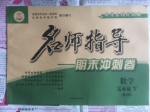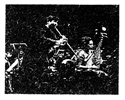题目内容
19.When you want to throw something out as"junk",better take a second thought as it may be of great value.In fact,scientists made the same mistake with DNA years ago,and now they are trying to get it right.We often say that DNA is a kind of acid that contains our genes.But the truth is that genes only make up 1 to 2 percent of our DNA,which caused scientists to believe that the rest of it is useless.
Nevertheless,instead of doing nothing,junk DNA,as it is called,turned out to be playing an important part in our body.If genes are like light bulbs,then junk DNA acts as switches.
They control which genes are used in a cell and how active they are.For example,they can determine whether a cell becomes a lung cell or a neuron (神经元).
The study,published in the journal Nature on September 5,started in 2003,and 442 scientists from 30 labs around the world were involved,according to Reuters.It is considered the biggest breakthrough in genomics(基因学)in a decade because it might help scientists find the cause of certain diseases.
It has long been known that many complicated diseases,such as cancer,are caused by tiny changes in DNA.But now scientists realize that most of the changes occur not in the genes themselves,but in the"junk"part of the DNA.They are able to keep track of how and why ihe switches change and then figure out new treatments and drugs.
"Our former understanding of DNA was like getting a picture of Earth from space,"Eric Lander from the Broad Institute,US,told The New York Times."You know the planet is there,but you cannot see exactly what it's like on the surface."
But now with the new study result"you can follow the roads and see the traffic circulation.That's exactly the same way we will use this data in cancer research,"explained Mark Rubin from Weill Cornell Medical College in New York.
41.Which of the following would be the best title for the passage?C
A.DNA--The Cause of Cancer
B.What Is DNA?
C.A New Discovery for"Junk DNA"
D.A Misunderstanding of Genes
42.What does the underlined phrase"get it right"in the first paragraph refer to?B
A.Discovering new types of DNA.
B.Recognizing the importance of junk DNA.
C.Understanding the role genes play in DNA.
D.Telling useful DNA from useless one.
43.The author explains how different parts of DNA work by.B
a.introducing a general theory
b.making a metaphor(比喻)
c.giving examples
d.displaying research data
A.ac
B.bc
C.ad
D.cd
44.The results of the study mentioned in the article show thatD
A.cancer is caused by tiny changes in genes themselves
B.the study of junk DNA is less important than the study of genes
C.changes in junk DNA do not affect genes
D.junk DNA is very important for the functioning of our cells
45.Which of the following statements might Mark Rubin agree with?C
A.The finding of our genes is enough to fight against cancer.
B.The battle against cancer will be won within two years.
C.The finding of junk DNA throws light on how we might cure cancer.
D.The new treatments and drugs will change junk DNA quickly.
分析 短文主要介绍了垃圾DNA其实在我们的身体也扮演着重要的角色.
解答 41.C,主旨大意题,根据短文介绍了垃圾DNA其实在我们的身体也扮演着重要的角色,这是医学上一个新的发现,因此最好的题目为C.
42.B,推理判断题,根据前面提到scientists made the same mistake with DNA years ago,多年前科学家对于垃圾DNA也犯了同样的错误,但是他们现在正在纠正,也就是重新确认垃圾DNA的重要性,故答案为B.
43.B,细节理解题,根据If genes are like light bulbs,then junk DNA acts as switches可知作者使用比喻来解释DNA的作用,以及 But now with the new study result"you can the roads and see Uic traffic circulation.Thafs exactly the same way wc will use this data in cancer research具体举出例子,故答案为B.
44.D,细节理解题,根据句子They control which genes are used in a cell and how active they are可知,垃圾DNA对于我们细胞的功能是非常重要的,故答案为D.
45.C,推理判断题,根据句子Thafs exactly the same way wc will use this data in cancer research可知,对于垃圾DNA找出的数据将运用到癌症的研究中,故答案为C.
点评 解答任务型阅读理解题,首先对原文材料迅速浏览,掌握全文的主旨大意.因为阅读理解题一般没有标题,所以,速读全文,抓住中心主旨很有必要,在速读的过程中,应尽可能多地捕获信息材料.其次,细读题材,各个击破.掌握全文的大意之后,细细阅读每篇材料后的问题,弄清每题要求后,带着问题,再回到原文中去寻找、捕获有关信息.最后,要善于抓住每段的主题句,阅读时,要有较强的针对性.对于捕获到的信息,要做认真分析,仔细推敲,理解透彻,只有这样,针对题目要求,才能做到稳、准.

 名师指导期末冲刺卷系列答案
名师指导期末冲刺卷系列答案 开心蛙口算题卡系列答案
开心蛙口算题卡系列答案一 !The government really should do something.( )
| A. | Good idea | B. | I got it | ||
| C. | You bet | D. | That's all right |
| A. | handle | B. | raise | C. | explore | D. | strengthen |
| A. | had not been | B. | have not been | C. | did not go | D. | have not gone |
